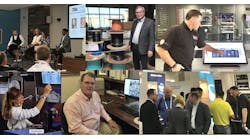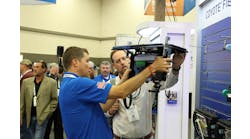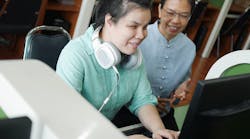Latest from Professional Development/Leadership
Google Is Unusable For 1B People W/Disabilities
Spurring The Launch Of First Accessible Search Engine
Google processes over 3.5 billion searches per day. For most people, quickly looking for an answer on the popular search engine is a no-brainer. However, for the more than 1 billion people who struggle with disabilities and internet accessibility worldwide, searching on Google can be a frustrating and fruitless experience. In fact, only 2% of all search results on Google are accessible to all.
This is why accessiBe, a market leader in web accessibility, is launching accessFind, a nonprofit initiative providing the first-ever search engine created specifically for Internet users with disabilities. In partnership with leading NGOs like United Spinal Association, accessFind will create an index of accessible websites only, producing a tailor-made browsing experience for users with disabilities, connecting millions of users with disabilities to the potential of the Internet, giving people with disabilities an opportunity to easily and quickly search the web.
accessFind In A Nutshell:
- A nonprofit initiative, created with the community for the community and in collaboration with influential disability-focused organizations.
- A way for people with disabilities to enjoy the tremendous opportunities the internet has to offer, such as finding an electrician, paying rent, and so much more.
- Powered by accessiBe, as part of our mission to make the Internet accessible by 2025.
- accessFind also opens more opportunities for businesses by enabling them to gain greater exposure to potential customers, people with disabilities, that comprise a huge segment of the market. To submit your website at no cost click here.
Understanding The Web Accessibility Gap
According to the CDC, 1 in 4 adults has a form of disability. This is 20% of the population that needs accessibility but currently, out of 350 million active websites in the US (and over 1 billion worldwide!), less than 2% are accessible to people with disabilities. This disproportion has created the web accessibility gap.
This gap is growing each day as more websites are being built than made accessible. This is because most websites are built by business owners who use affordable, template-and-plug-in-based website builders that aren’t able to provide accessibility by default.
Though there are only about 250,000 accessible websites in the US, a drop in the bucket compared to the total number of websites, this is still a significant amount of services, online stores, and informational websites that web users with disabilities would, and should, use today if they knew where to find them.
So how can people with disabilities find these accessible websites and enjoy the opportunities that the Internet has to offer?
Currently, the chances of finding an accessible website in a particular search are slim to none because the total number of accessible websites is so low compared to how many websites exist. Since there are only 8 results on the first results page, in most cases there won’t be an accessible website for people with disabilities to choose from. This makes the search experience frustrating and even futile for people with disabilities.
Search engines are practically the gateway to the Internet. We make 5.4 billion online searches per day, but for more than 1.5 billion people with disabilities around the world, this gateway is practically closed.
"For too many people, using popular search engines is a frustrating and fruitless experience," said Shir Ekerling, CEO of accessiBe. "With the understanding of the web accessibility gap, the decision to put our resources into accessFind was an easy one. With accessFind, users with disabilities finally have a search engine that provides them with results of readily accessible websites, working to bridge the existing digital divide and giving accessible businesses direct value from making their website accessible and inclusive."
accessFind is created alongside people with disabilities and in collaboration with leading disability organizations such as The United Spinal Association, Columbia Lighthouse for the Blind, The Viscardi Center, The IMAGE Center of Maryland, Earle Baum Center of the Blind, Senspoint, and Determined2Heal, who take the strategic role as accessFind’s founding members.
Forward Is The Only Direction
Here’s the accessibility dilemma: small businesses, who make up 99% of the market, knock on our door with a lawsuit worth $30K in compensations on one hand and a $20K quote for an accessibility project on the other. The source of these litigations is that people with disabilities simply want to be included in the modern, digital era. So they turn to legislation as a last resort.
Who’s to blame? The business owner who’s caught off guard or the individual who is asking for basic civil rights? The web isn’t accessible by default and many aren’t aware of this. The longer we wait to fix it, the longer both sides lose.
By replacing manual, line-by-line remediation with AI and automation, we can make thousands of websites accessible in the amount of time it used to make just one — and at a fraction of the cost. Our AI is taught to go beyond basic requirements and create an exceptional digital experience for people with disabilities.
Luckily, the rise of AI has enabled us at accessiBe to solve web accessibility using a product, rather than a service, allowing us to make compliance in-reach for every business, driving a real accessibility revolution, and achieving a WIN for all sides.
For more information, including videos, please visit:
https://accessibe.com/blog/news/introducing-accessfind-search-engine
Being a Founding Member enables disability-focused organizations to represent their community, provide insights, and test and suggest features and improvements so the solution works better for their communities. If your organization would like to lead the future of inclusive search, we invite you to join as Founding Members and have a seat at the table alongside other like-minded organizations. Find out more at https://accessfind.com/.




